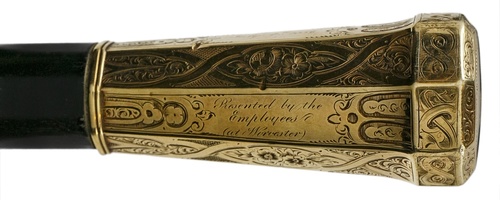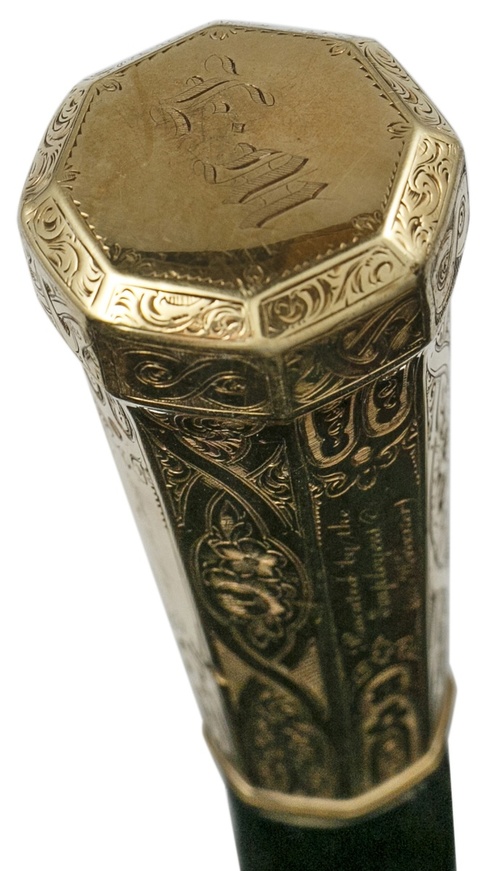Auction: 394 - Coins, Commemorative Medals, Autographs and Documents - e-Auction
Lot: 716
Mid-19th Century Gold-handled Walking Stick Presented to Edwin Moody, Anti-Slavery Abolitionist who was arrested and charged with assaulting the notorious slave catcher, bounty hunter, and Federal Deputy-Marshall Asa O. Butman during the Worcester anti-slave riots of 1854, and Agent for the Boston & Worcester Railroad Company.
36" tapering ebonized stick; heavy, octagonal, faceted rose gold handle with sheath, 3"; with brass-mounted steel ferrule. The handle not hallmarked, but tested. Engraved in four panels of the handle sheath: "Presented by the Employees (at Worcester) of the Boston & Worcester Rail Road Co. to their late Agent Edwin Moody Esq July 4th 1857"; alternating with floral panels. The knob engraved with Moody's monogram: "E.M."
A resident of Worcester, Massachusetts, Edwin Moody (1803-1870) was born to Daniel and Sarah Moody. He served as the Boston & Worcester Railroad's ticket agent at Worcester from 1837 to 1840 and was subsequently the company's Freight and Station Agent there. The 1860 census records Edwin Moody as a 56-year-old railroad agent resident at Worcester with a wife, Nancy, two daughters and a son, the owner of real estate valued at $5,500 and with a personal estate valued at $3,500. By 1870, he was retired and living in Worcester with his wife and one daughter. Moody died June 6, 1870.
During the mid-19th Century the inhabitants of Worcester lent their support to the leading reform movements of the day, agitating for a wide variety of causes, including the Abolitionist Anti-Slavery, Women's Rights (Clothing Reform) and Temperance movements. Particularly popular was the Anti-Slavery cause, the Free Soil (Anti-Slavery) Party being founded there in 1848. Worcester was also home to the prominent abolitionist Thomas Wentworth Higginson during the 1850's, who described Worcester as being a "seething center of all the reforms". By 1850 Worcester was also something of a transportation hub, the meeting point for a number of interconnecting railroad and stagecoach routes. As a result, it became an important link in the clandestine "underground railroad", along which escaped slaves were smuggled from the slave states in the south to safe havens in the non-slave northern states and Canada.
Moody's wife, Nancy, herself played a prominent role in the underground railroad and in the provision of aid for the relief of destitute freed slaves. During the early years of the Civil War, she was one of the 14 founding members of the Ladies Relief Committee in Worcester, set up to aid escaped slaves. In 1862 she was appointed to the executive of the Ladies Committee charged with collecting and distributing new and used clothing to destitute former slaves.
Being home to large numbers of abolitionists, Worcester also became a safe haven for escaped slaves. By the mid-1850s, it was home to a considerable number of escaped slaves and their descendants. On the evening of Saturday, October 28, 1854, the Federal Deputy-Marshal, slave-catcher, and bounty hunter Marshall Asa O. Butman, arrived in Worcester hunting for a fugitive slave by the name of William Jankins, a barber who had established himself in and had become a well-to-do resident of that city. Butman had just come from Boston, where his recent arrest of two escaped slaves had triggered a major outbreak of rioting, ending only when the military was called out to ensure the escapees were returned to slavery. On arrival in Worcester, Butman took lodgings at the American House Hotel. News of his arrival spread like wildfire and Worcester's Anti-Slave Hunter Vigilance Committee began to monitor the hotel and Butman's movements, after which a large number of abolitionists assembled outside the American House Hotel. The following morning some of the assembled crowd approached the hotel's owner, demanding that he eject Butman.
Butman became agitated and drew a pistol from his pocket and threatened the protesters. A complaint was made and Butman was arrested for carrying a concealed weapon. Arraigned the following day, he was released on $200 bail. During the arraignment, a large crowd of protesters descended on the courthouse, occupying the courtroom and gathering outside. The City Marshal, Lovell Baker, intervened and, fearing for Butman's safety, removed him to his office in the court building. When Lovell briefly left his office, a group of half a dozen members of Worcester's escaped slave community broke in and attacked Butman, one of them punching him in the head and knocking him to the ground. Marshal returned and locked both Butman and his attacker inside his office. Soon after, a local solicitor, George Hoare, emerged from the courthouse, having evidently reached an agreement with Butman, and addressed the crowd. "Fellow citizens. It is some ten years ago that my father and sister were driven out of Charleston South Carolina by an infuriated mob of slave holders, because, in obedience to a commission issued by the authority of the State of Massachusetts, he had gone thither to test, in the courts of the United States, the validity of those laws under which they imprisoned our citizens, for no crime but the color of their skins; and none of you I think will accuse me of having any great sympathy for slave holders. It is gratifying to see such a feeling of indignation manifested to an individual whose acts have rendered him so odious in your eyes; but yet I trust none of you have come here to do him any personal violence. Even in Charleston, low and degraded as the majority of its citizens are, some persons were found to sustain the majesty of the law; and to their interference my father and sister owed the preservation of their lives. Let it not be said of us, citizens of Worcester, that we have less respect for law and order than was manifested by them. Let us remember that the cause we all have so much at heart cannot but suffer if we engage in acts of violence against this obnoxious and odious individual who, whatever may have been his past course, assures me that he came here with no intention of molesting a slave. Believing that your sentiments upon this subject are in unison with mine, I have ventured to assure Mr. Butman, in your behalf, that he may depart from the city unmolested and in peace; and I have offered to accompany him to the depot, so that he may leave by the earliest train."
Hoare re-entered the courthouse, returning with Butman on his arm, and the two attempted to make their way through the crowd to the Boston & Worcester Railroad Company's depot. As they did so, the crowd closed in on them, impeding their passage, so a larger escort was called for and a local clergyman, Reverend Higginson, took Butman's other arm and a party of abolitionists formed a bodyguard around Butman and his two protectors. Together, Butman and his escort made their way through a crowd of about 600 protestors, Butman being pelted with eggs and repeatedly assaulted by members of the crowd along the way. By the time Butman and his escort reached the railway station the following crowd of protestors had swelled to over 1000. Unfortunately for Butman, the train had already departed, so a horse-drawn wagon was hastily requisitioned and with the Reverend Higginson seated beside him as a guarantee of safe conduct, Butman sped out of town. The City Marshal followed Butman's wagon out of Worcester in his own horse and buggy and, once they had travelled a safe distance from the town, transferred Butman into his buggy and drove him the forty miles to Boston.
As he made his escape Butman acknowledged that he owed his life to Worcester's abolitionists. Not surprisingly, he kept his promise never to return to Worcester. Butman was the last slave catcher to operate in Massachusetts. Several days after the riots, on November 7th and 8th, six Worcester men were arrested and charged with riotous behavior and assaulting Butman as he attempted to leave the city -- Edwin Moody, Stephen Foster, Joseph Howland, Adin Thayer, Alexander Hemmenway and Solomon Dutton. Given the city's strong abolitionist sentiment, it proved impossible to convict any of the accused, and all charges against the six were eventually dropped. Butman's activities, the Butman Riot and his escape from Worcester were widely reported in the press of the day.
Well-preserved.
Sold for
$700
Starting price
$625











